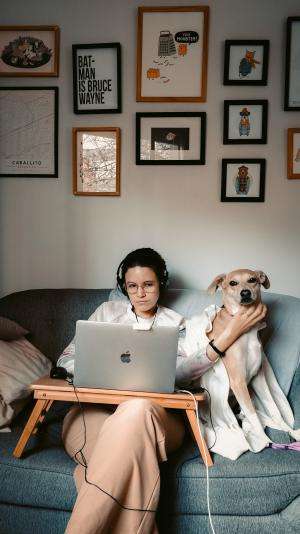When home space is public space…

Published by Professional Social Work magazine, 11 January, 2022
We’ve all seen the television interviews where a toddler comes crashing into the room while mummy or daddy is speaking live to the nation…
Such calamities are hilarious - we all know how hard it is to be working from home these days.
But for social workers there are professional pitfalls with potentially more serious consequences.
Lindsey Huxtable-Dowd is a senior practitioner on BASW’s advice and representation team, and has dealt with cases where a momentary lack of judgement has led to disciplinary action.
Increasingly, there are common scenarios social workers should be watching out for when working from home.
Like working from your kitchen in summer with the patio doors wide open for all the world to hear.
Or leaving your laptop open, only to discover later that a family member has been having a peak when they shouldn’t have been…
Or you live in a shared house where your conversations can probably be overheard.
“We see the sharp end of this all the time,” she says.
“The pandemic has certainly brought confidentiality into sharp focus, and it’s important to remember that Social Work England takes breaches very seriously indeed.
“Homeworking raises issues about trust in your family relationships. You generally think you can completely trust your spouse, partner or children.
“But we’ve had situations where social workers working from home have ended up being referred to the Local Authority Designated Officer (LADO) and disciplined.
“And that is because anyone in a position of trust who isn’t safeguarding their clients sufficiently can wind up having their case heard in a multi-agency meeting to consider whether that person is a significant risk.
“If you are found to be a ‘person of concern’ because you left your laptop open or paperwork lying about, the consequences of not considering your home office environment can be considerable.”
Lindsey doesn’t want to scare people. It’s more about making us think about how the pandemic has changed the way we work, and how moving from office to home needs careful thought.
“You have to treat your home as if you were office-based,” she says, “but more so.
“Your home is a public space. Your family is ‘the public’. So it’s important to anonymise conversations about sensitive matters, particularly where a person’s identity could be revealed.”
Social workers have long been aware of the need to be careful around confidentiality, and many of the scenarios they face predate the pandemic.
You may get a call from your manager. Do you take the call? What if you are on public transport? Can you go somewhere more private? Or do you send a message that you’ll call back soon?
Or what if you come out of a service user’s home and pick up a call on your mobile about another case? Do you always remember that the service user could overhear you?
In a pandemic context, many potential data breaches are in the arena of technology, Lindsey says.
“There are Teams meetings where you get chatting in the break. You may say something, have a moan like you would in the office. Only you aren’t in the office, and the manager overhears you. That could land you in trouble.
“Or you can be in a highly sensitive Zoom meeting, discussing quite distressing detail, and a housemate or family member walks across the room in the background.”
Lindsey recommends that social workers seek out their employer’s policy guidance.
“You need to be up-to-date with your organisation’s data, GDPR and work from home policies. If there is annual training, make sure you do it.
“Private or smaller organisations may not be so policy-focused as large authorities. So it’s up to you to check what is expected and how an organisation can support you with obligations.”
There are basics that all social workers should adhere to - lock up your laptop, lock away paperwork, print only what is necessary.
But more than that, Lindsay says, you have to be mindful of your physical environment, of your online behaviour.
“Think about your physical space, your day-to-day practice. You may be used to discussing cases with colleagues in the office, but many of us aren’t in the office now.
“Be aware of your surroundings, and if it’s absolutely necessary to have that sensitive conversation, make sure you anonymise details so people can’t be identified.”
If you are concerned about any aspect of your employment situation you can contact the BASW Advice and Representation team by email at ARAS@basw.co.uk
